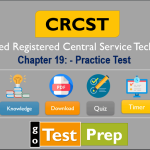CNA Practice Test 2021 NNAAP® Official Test
The Free 2021 CNA NNAAP® Nurse Aide Practice Written Exam is a comprehensive assessment designed for individuals aspiring to become Certified Nursing Assistants (CNAs). This particular exam, relevant to the year 2021, serves as a crucial step in validating the competencies and knowledge necessary for a career in nursing assistance. CNA Practice Test 2021 Duration: …





